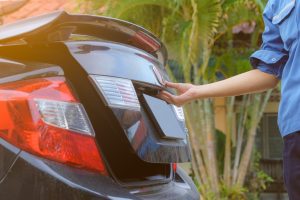You just got pulled over for running a stop sign, and you can’t remember what’s in the trunk. Can the police search your car trunk during a routine traffic stop? Keep reading for the low-down on when the police can search your car.
You probably know that the U.S. Constitution makes it very difficult for the police to search your property based solely on their suspicion that you’re involved in a crime. Indeed, there are strict restrictions on when the police can examine you and your property. That said, there is a chance that the police will ask to search your trunk when they stop your vehicle for a traffic violation.
When Can the Police Search Your Car Trunk?
The critical thing to never forget when you’re pulled over for a minor traffic violation is that the police can’t ask to open your car trunk based on instinct. Instead, no matter how much of a gut feeling the cop has that you’re hiding something they can’t search the car without (1) your permission, (2) probable cause or a (4) a warrant.
There’s a strong chance that they’ll ask for your consent to search your property. It’s not a crazy suspicion that the police will try to make you feel that the smart thing to do is to comply with their search request. However, legal experts suggest that you should never agree to a search. Instead, force the officer to come up with a warrant or probable cause.
Note that probable cause is one reason that the police can use to pop open your trunk. Mostly, a police officer must have information or evidence that you’re involved in a crime before performing a search. Visible drug paraphernalia is a typical example of when the police may have probable cause to search.
No matter what the circumstances, you must consent to the search of your vehicle if the police have a signed search warrant.
Use Your Right to Silence
Even though you can’t necessarily prevent a police search, you can do yourself a favor and exercise your right to silence. The officer who pulls you over has the authority to ask for your identification so you must turn over your (1) driver’s license, (2) vehicle registration, and (3) proof of insurance upon request. Once you turn over those three documents, follow these suggestions from the ACLU
- Politely tell the police that you aren’t going to answer any questions until you’ve talked to your attorney.
- Say that you won’t consent to a search.
- Decline to sign any documents.
- Immediately ask for an attorney when arrested.
Lastly, the answer to the question of “can the police search your car trunk?” is yes. The police have multiple avenues to legally check your trunk if they have probable cause that you may have committed a crime.
Contact us at Gibson Bail Bonds if the contents of your trunk land you behind bars. We’ll post your bond so you won’t have to spend time in a jail cell.


